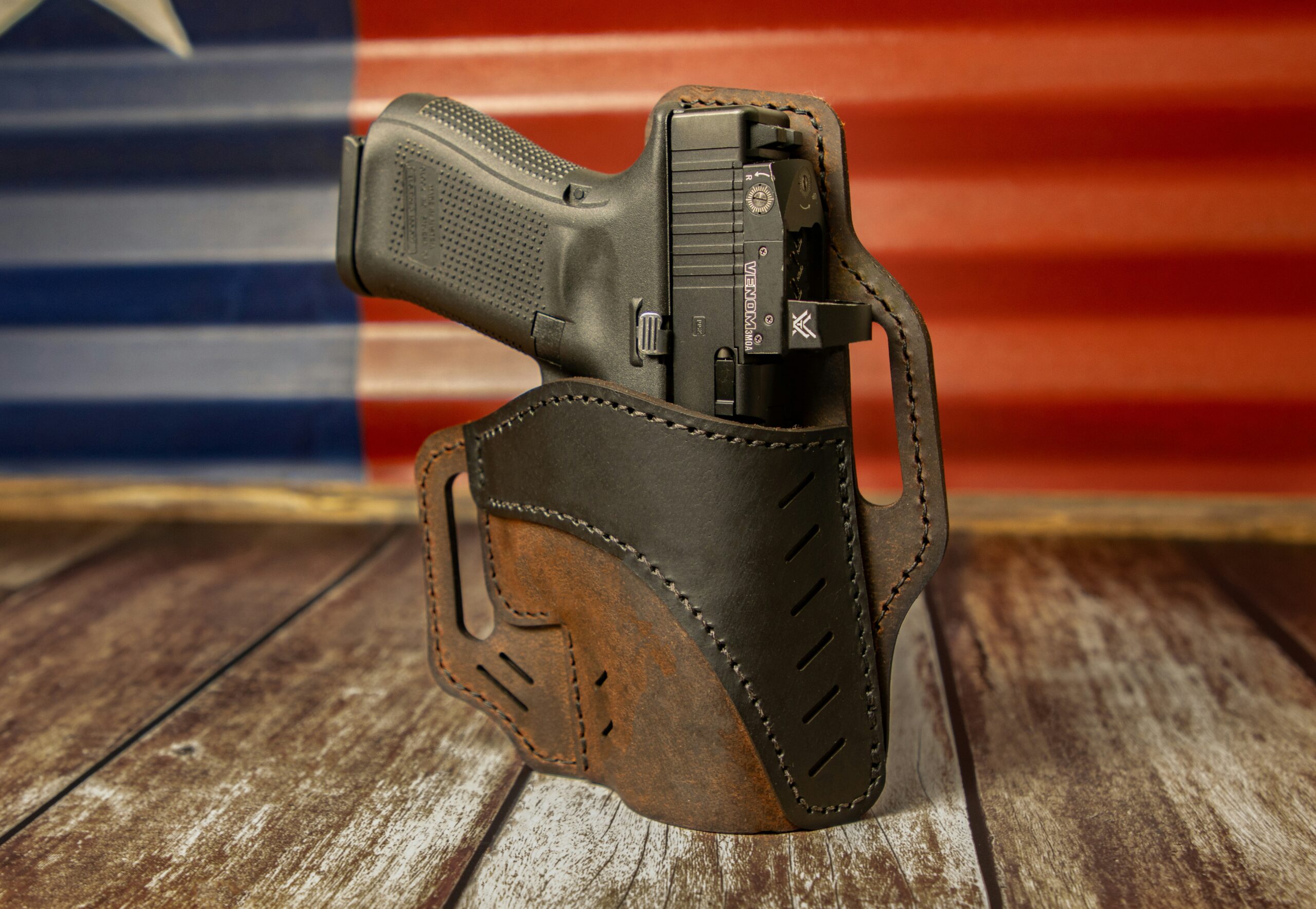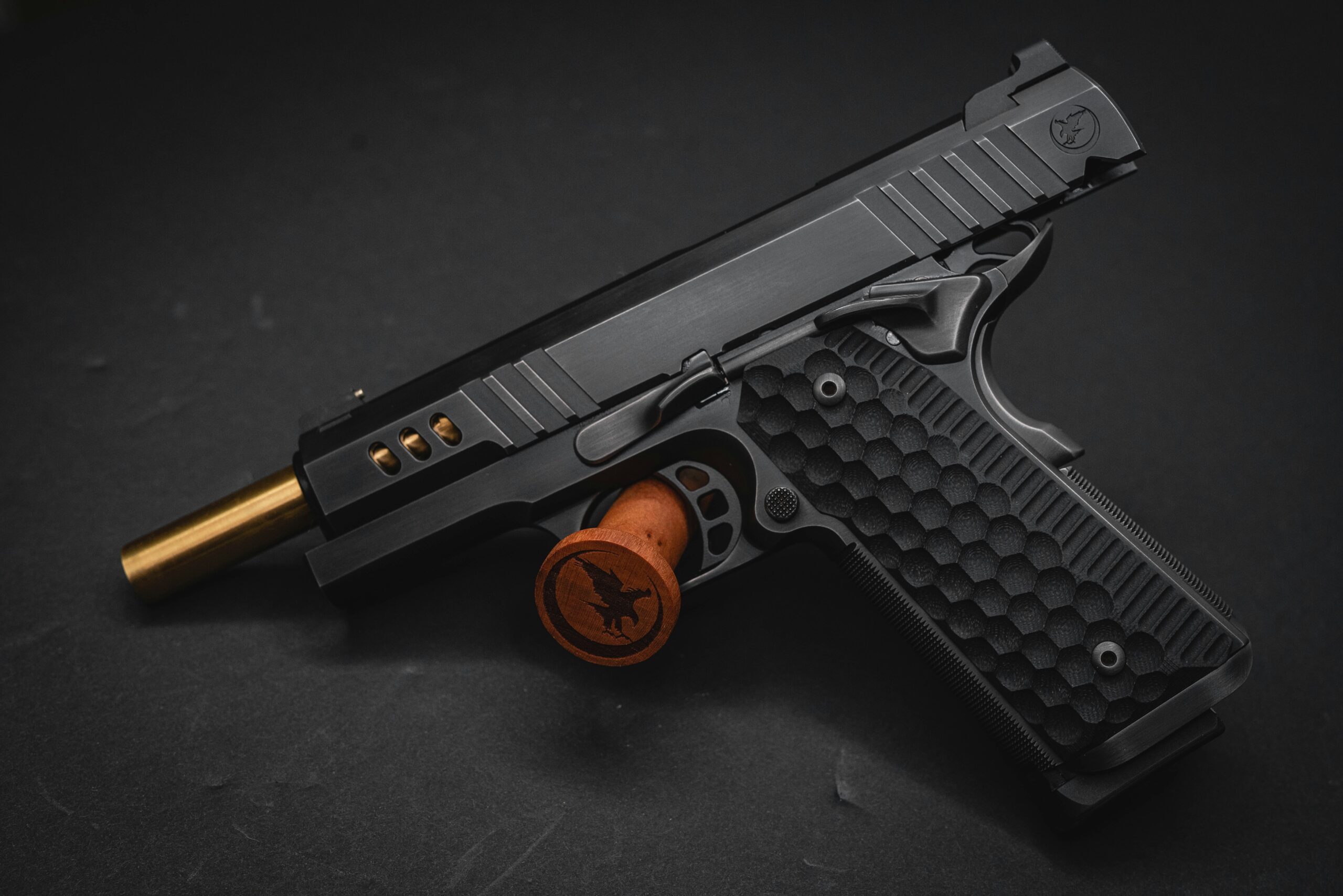Imagine being able to dramatically improve your accuracy when shooting a handgun simply by using a rifle scope. This innovative combination might be the key to taking your shooting skills to the next level. But, the question remains: can using a rifle scope on a handgun truly enhance your accuracy? In this article, we will explore this intriguing topic and uncover the potential benefits of this unconventional pairing. Get ready to unlock the secrets behind achieving pinpoint precision with your handgun.
Understanding Scopes for Firearms
When it comes to firearms, understanding the scopes available for different types of weapons is crucial. Scopes play a key role in enhancing accuracy and precision while aiming and shooting. However, it’s important to differentiate between rifle scopes and handgun scopes as they have distinct functions and features.
Differentiating between rifle scopes and handgun scopes
Rifle scopes are primarily designed for long-range shooting and are mounted on rifles. They typically offer higher magnification capabilities, allowing the shooter to target objects at a significant distance. On the other hand, handgun scopes are specifically designed for handguns and offer lower magnification levels. Handgun scopes are optimized for shorter distances, making them ideal for close-range shooting situations.
Functions and features of a rifle scope
Rifle scopes are equipped with various functions and features that contribute to improved accuracy. One of the key features is the reticle, also known as the crosshair. The reticle allows the shooter to precisely aim at the target by providing a clear point of reference. Additionally, rifle scopes often have adjustable windage and elevation turrets, which help compensate for factors such as wind direction and bullet drop over long distances. These adjustments ensure that the bullet hits the intended target accurately.
Functions and features of a handgun scope
Handgun scopes, while similar to rifle scopes in some aspects, have distinctive functions and features tailored for handgun shooting. Handgun scopes generally have a lower magnification range, typically between 1x and 4x. This lower magnification allows for faster target acquisition and better situational awareness, essential for close-quarters combat. Handgun scopes also often incorporate illuminated reticles, making it easier to aim in low-light conditions. Additionally, some handgun scopes have extended eye relief to accommodate the recoil generated by handguns.
Accuracies of Different Firearms
To truly understand the implications of using a rifle scope on a handgun, it’s essential to explore the inherent accuracies of both firearms individually and then compare them.
Exploring accuracy levels of handguns
Handguns are generally considered to be less accurate than rifles due to several factors. The shorter barrel length and often limited sight radius of handguns can lead to increased bullet dispersion at longer distances. The inherent mechanical limitations of handguns, such as a heavier trigger pull and less stable shooting platform, also contribute to decreased accuracy. However, it’s important to note that handguns can still be accurate within their intended range, typically around 25 yards or less.
Examining inherent accuracy of rifles
Rifles, on the other hand, are known for their superior accuracy. Longer barrel lengths, more efficient propellants, and better sight radius all contribute to improved accuracy. Rifles have a longer effective range, often extending beyond several hundred yards. The stability of shooting a rifle, especially when shooting from a rested position, allows for precise aiming and consistent shot placement.
Comparing accuracy level of a handgun versus a rifle
When comparing the accuracy level of a handgun versus a rifle, it is clear that rifles generally have the advantage. Due to their design, rifles are inherently more accurate than handguns. However, this does not necessarily mean that handguns are inherently inaccurate. Handguns can still be utilized effectively within their intended range, despite some limitations.

Scope Use on Handguns
Now that we have established the accuracy differences between rifles and handguns, we can assess the potential benefits and drawbacks of using a scope on a handgun.
Assessing potential benefits of using a scope on a handgun
The primary benefit of using a scope on a handgun is improved sight picture and target acquisition. The magnification provided by a scope allows for a clearer view of the target, especially at longer distances. This enhanced visibility can contribute to improved accuracy and shot placement. Additionally, the use of a scope can help compensate for some of the inherent limitations of handguns, such as shorter sight radius and increased bullet dispersion.
Clarifying the drawbacks of scoping a handgun
While using a scope on a handgun has its benefits, it’s important to consider the drawbacks as well. One significant drawback is the added weight and bulkiness that a scope introduces to the handgun. This may affect the firearm’s balance and maneuverability, making it less suitable for certain shooting scenarios. Another consideration is the increased recoil that can be experienced when using a scope on a handgun. The higher magnification of the scope amplifies the recoil force, potentially making it more challenging to control the firearm during rapid follow-up shots.
Profiling common usage scenarios for scoped handguns
Despite the drawbacks, there are specific usage scenarios where using a scoped handgun can be advantageous. Law enforcement and military personnel may benefit from the increased accuracy and target identification capabilities provided by a scope. For example, engagement from a concealed position or during hostage situations could benefit from the improved sight picture and target acquisition offered by a scope. Additionally, some competitive shooting disciplines, such as handgun hunting or precision shooting competitions, may allow the use of scoped handguns, where the potential accuracy improvements outweigh the associated drawbacks.
Rifle Scopes on Handguns: Suitability and Cases
Now that we have explored the benefits and drawbacks of scoping a handgun, it’s essential to detail the suitability and compatibility of rifle scopes on handguns.
Detailing cases for utilizing rifle scopes on handguns
While handgun scopes are specifically designed for handguns, there may be cases where utilizing a rifle scope on a handgun is appropriate. Some large-frame handguns, such as certain revolvers or semi-automatic pistols, have sufficient strength and stability to handle the recoil forces and weight of a rifle scope. In these cases, a rifle scope may provide higher magnification options and enhanced sight picture compared to a handgun scope.
Discussing the suitability and compatibility of rifle scopes on handguns
However, it’s important to exercise caution when considering the use of a rifle scope on a handgun. Not all handguns are suitable for a scope conversion, especially smaller, lightweight models that may not have the necessary structural integrity to handle the added weight and recoil. Additionally, mounting systems and adapters designed for attaching a rifle scope to a handgun must be carefully evaluated to ensure proper fit and alignment. Compatibility and suitability should be thoroughly assessed before attempting a scope conversion on a handgun.

Potential Accuracy Improvements
With the understanding of the benefits and considerations surrounding scoping a handgun, let’s investigate the theory behind potential accuracy improvements and examine real-world experiences and empirical data.
Investigating the theory behind improved accuracy
The theory behind potential accuracy improvements when using a scope on a handgun stems from the enhanced sight picture and target acquisition capabilities provided by the magnification of the scope. This improved visibility allows the shooter to precisely align the reticle on the target, resulting in more accurate shot placement. Additionally, the use of adjustable windage and elevation turrets on some rifle scopes may compensate for environmental factors and ballistics, further enhancing accuracy.
Sharing real-world experiences and empirical data on accuracy increase
While the theory suggests improved accuracy, real-world experiences and empirical data provide valuable insights. Some shooters report improved precision when using a scoped handgun, particularly at longer distances where the added magnification allows for better target identification. However, it’s important to note that individual skill, training, and familiarity with the specific firearm and scope setup can significantly influence accuracy. Empirical data on accuracy increase with scoped handguns is limited, and thorough testing and evaluation are necessary to draw definitive conclusions.
Making the Scope Conversion
If you decide to proceed with attaching a rifle scope on a handgun, it’s crucial to understand the required equipment and tools, as well as the step-by-step process.
Exploring required equipment and tools for attaching a rifle scope on a handgun
To perform a scope conversion on a handgun, you will need specific equipment and tools. First and foremost, you will require a suitable rifle scope that meets your desired magnification and features. Additionally, mounting systems or adapters designed specifically for attaching a rifle scope to a handgun are necessary. These adapters should be compatible with the specific handgun model and take into account factors such as recoil forces and alignment. Ensure that you have the appropriate tools, such as screwdrivers or Allen wrenches, to properly secure the mounting system to the handgun and attach the scope securely.
Walking through a step-by-step scope conversion guide
Performing a scope conversion on a handgun should be approached with caution and meticulousness. It is essential to follow a step-by-step guide to ensure a proper and secure setup. Here is a general outline of the process:
- Ensure the handgun is unloaded and follow proper safety procedures.
- Select a mounting system or adapter designed for attaching a rifle scope to your specific handgun.
- Attach the mounting system to the handgun, ensuring a secure fit and proper alignment.
- Attach the rifle scope to the mounting system, following the manufacturer’s instructions for proper installation.
- Verify that the scope is properly aligned and level before tightening all screws and fasteners.
- Perform a function check of the scope and ensure that it adjusts correctly and holds zero.
It’s crucial to consult the manufacturer’s instructions for both the handgun and the specific mounting system to ensure that you follow proper procedures and maintain safety throughout the scope conversion process.

Safety Precautions and Recommendations
While scoping a handgun can provide potential accuracy improvements, it’s essential to be aware of potential dangers and risk factors associated with the modification. Implementing safety precautions and preventive techniques is key to mitigating these risks.
Highlighting potential dangers and risk factors when using rifle scopes on handguns
One of the most significant danger associated with using a rifle scope on a handgun is the increased recoil force. The higher magnification of the scope amplifies the recoil, potentially affecting the shooter’s ability to control the firearm and resulting in erratic shot placement. Additional weight and bulkiness introduced by the scope may also affect the handgun’s balance and handling characteristics, increasing the risk of accidental discharge or compromised maneuverability.
Offering safety measures and preventive techniques to mitigate these risks
To minimize the potential risks when using rifle scopes on handguns, several safety measures and preventive techniques should be followed. First and foremost, proper training and familiarization with the firearm and scope setup are crucial. This includes understanding the additional recoil forces and practicing proper grip and control techniques to manage the increased recoil. Regular maintenance and inspection of the mounting system and scope are essential to ensure they remain secure and in good working order. It’s also recommended to use appropriate eye and ear protection when shooting with a scoped handgun.
Taking these safety precautions and implementing preventive techniques will help ensure a safe shooting experience when using a rifle scope on a handgun.
Legal Concerns and Regulations
Before modifying any firearm, including attaching a rifle scope to a handgun, it’s important to understand the legal boundaries and regulations surrounding firearms modification in your region.
Outlining legal boundaries and standards for modifying firearms
Firearms laws and regulations vary from region to region, and it is crucial to be familiar with the legal boundaries and standards in your specific jurisdiction. Modifying firearms, including adding a scope to a handgun, may involve compliance with specific rules and requirements. These regulations often vary based on factors such as firearms classification, intended use, and local or national laws. It’s essential to research and follow all applicable laws and regulations to ensure compliance and avoid legal consequences.
Unpacking various regional and national laws regarding firearms modification
To gain a comprehensive understanding of the legal concerns and regulations surrounding firearms modification, it’s necessary to explore the specific laws in your region or country. Consulting local firearms authorities, legal experts, or official government websites can provide valuable information regarding the legality and requirements associated with attaching a rifle scope to a handgun. It’s important to be proactive in researching and understanding the laws to ensure compliance and responsible firearm ownership.
Field Expert Opinions
To gather a comprehensive perspective on using a rifle scope on a handgun, it’s valuable to collate professional insights from field experts and analyze their opinions on the subject matter.
Collating professional insights on the subject matter
Field experts, including firearms instructors, competition shooters, and firearm enthusiasts, can offer valuable insights based on their experience and expertise. Engaging with these experts through interviews, articles, or online forums can provide a range of perspectives and opinions regarding the use of a rifle scope on a handgun. It’s important to consider multiple expert opinions to gain a broader understanding of the subject matter.
Analyzing a collection of expert opinions on using a rifle scope on a handgun
Analyzing a collection of expert opinions can help identify common themes, specific recommendations, and potential considerations when using a rifle scope on a handgun. Experts may offer insights on specific firearm models or brands that are suitable for scoping, recommend training or practice techniques to optimize accuracy, or provide additional safety precautions to consider. By carefully analyzing and comparing expert opinions, you can make a more informed decision based on the gathered information.
Taking the Shot: Final Thoughts
In conclusion, the decision to use a rifle scope on a handgun must be weighed carefully against its potential benefits, drawbacks, and associated risks. The potential accuracy improvement offered by a scope must be balanced with considerations such as added weight, recoil, and maneuverability. It’s crucial to carefully evaluate the suitability and compatibility of a specific handgun for scoping and follow proper procedures to ensure a secure and functional setup.
Based on the gathered information, it is recommended to consider scoping a handgun only in specific use cases where the potential benefits outweigh the drawbacks and risks. Law enforcement personnel, military professionals, and competitive shooters may find value in utilizing a scoped handgun for enhanced accuracy and target identification in certain scenarios. However, it’s important to adhere to all legal regulations and safety precautions to ensure responsible firearm ownership and usage.
Ultimately, the decision to use a rifle scope on a handgun rests with the individual shooter, their specific needs, and their willingness to invest in training and practice to optimize the potential accuracy improvements. With careful consideration and informed decision-making, scoping a handgun can provide a valuable tool for shooters seeking increased precision and target acquisition capabilities.
